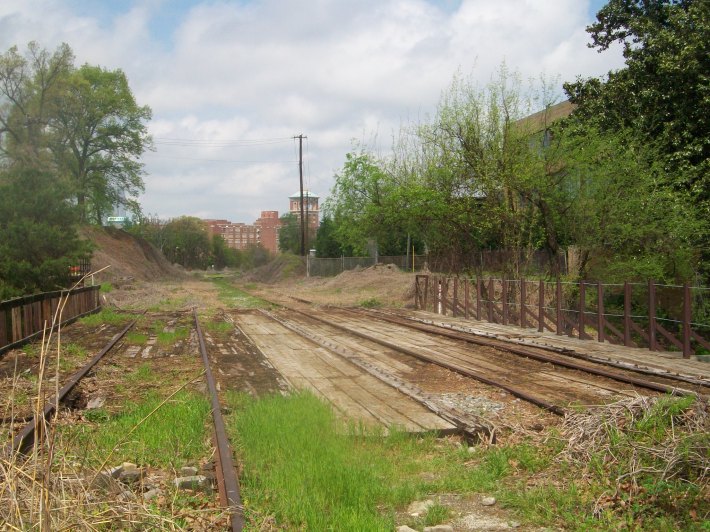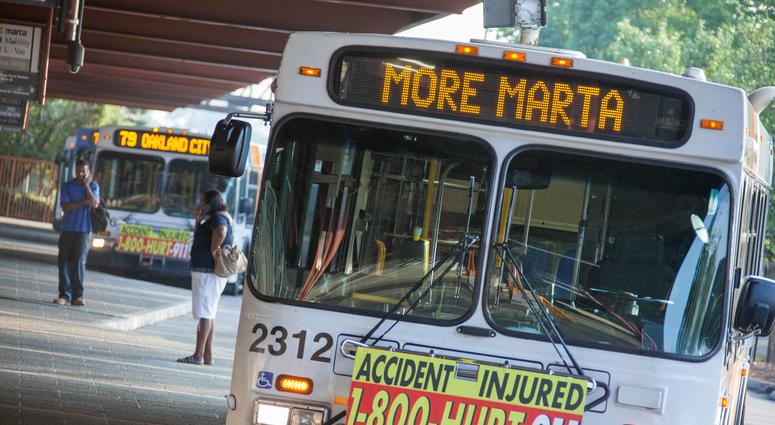Atlanta's public transit authority is set to spend more than half a billion dollars to build a 22-mile light rail line that will encircle the city — but the vital public infrastructure won't likely be done until 2050 because the authority isn't getting state or federal funding.
The Metropolitan Atlanta Rapid Transit Authority board voted last October to allocate $570 million toward transforming the Beltline, a defunct but verdant railway corridor similar to New York's High Line, into a modernized streetcar route that connects with train and bus stations throughout the city. There would also be 33 miles of trails and 2,000 acres of parks.
The funding would allow MARTA to begin laying streetcar tracks on 15 miles of the path, but the transit authority has made little progress over the past several years since the sales tax money began to be set aside for the Beltline, starting in 2016. But in the absence of federal and state funding, MARTA has to wait until it collects tax revenue over the next two decades in order to finish the project.
Transit advocates are fed up with the delays — and are planning to march along a stretch of the Beltline path on Oct. 6 to call attention to the lack of support from city and state leaders.
“Is that the best Atlanta can do? We don’t think so," Beltline Rail Now co-chair Patty Durand told Curbed.
MARTA hasn't applied for federal grants which could pay close to half of the project, and the state legislature — notoriously loathe to fund transit — hasn't bothered to pony up any money. Instead, MARTA prioritized other projects like extending the streetcar route to Ponce City Market and building the Clifton Corridor spur to Emory University, both of which are significantly more expensive per mile than the Beltline.
"City leaders are shortchanging the transit portion of the Beltline in favor of other projects that aren’t widely embraced and certainly aren’t transformative or ambitious," Durand added.
MARTA hasn't applied for federal funding because the agency must submit its priorities to a regional transportation agency, the Atlanta-Region Transit Link Authority (ATL), which will send a request to the feds.
This time, at least, Georgia officials want this project to happen. Atlanta's two-tiered transit system, like housing and land use policy, has its roots in 300 years of systemic racism. State legislators and county leaders catering to white suburban constituencies have underfunded mass transit for decades because it is largely used by people of color.
Voters in several suburban Atlanta counties repeatedly rejected ballot measures to join MARTA, fearing that transit would bring about desegregation. Indeed the very notion of mobility in Atlanta has been shunned and referred to derisively even today because of its connotations with African-American economic vitality.
These biases have led state officials to cede control over transportation policy and funding to powerful county leaders who raise sales tax revenue for projects within their districts — a strategy that doesn't exactly help commuters move easily around the various job centers across the urban region.
This decentralized system for spending on infrastructure has to change if the metro Atlanta region and the state's other major cities want to grow sustainably through the next century, advocates say.
"State funding is necessary for all levels of transit. That doesn’t exist right now. That’s a political battle we’ll have to fight," said Kotak.

One of the largest obstacles to getting state funding for rail and bus projects is that the Georgia constitution doesn't permit gas tax revenue to be spent on transit — leaving about $1.9 billion in the 2019 budget off the table. Revising the state constitution to shift funding from highways and bridges toward rail lines and buses is still a long time away, advocates say. Instead they're focused on convincing the Georgia Department of Transportation to spend between $150 and $170 million per year that does not come from motor fuel revenue on transit.
"A lot of it is talking to GDOT officials and tell them, 'Hey you have this pool of money spend it on something other than roads,'" Sierra Club Rail Committee Chair Tejas Kotak told Streetsblog. "If even half of that went to transit that would be a sea change."
Convincing Atlanta's suburban counties to spend that money on rail and bus projects that benefit the entire region is another matter.
The Metro Atlanta region consists of nine counties, but only three have opted into joining MARTA's network, while the rest raise and spend sales tax revenue on transportation projects largely within the confines of their counties. That means commuters in Atlanta's suburbs have few options to access jobs and entertainment in downtown Atlanta other than their own cars.
In March, Gwinnett County voters rejected a referendum that would have allowed MARTA to expand transit into the county, paid for through a 1-percent sales tax. But county leaders are trying again and created a Transit Review Committee this month to prioritize transit projects by the end of the year and prepare a second referendum for voters in 2020.
Cobb County, another transit-averse suburb, is exploring whether to raise its sales tax by a penny or half-penny in order to pay for a slew of projects and create a special transit district to impose a tax for local transit initiatives. County leaders don't have to finalize their plans until the end of 2021 which would give them time to put the penny measure on the ballot in 2022.
"It might be the only option right now and it is certainly not ideal," said Citizens for Progressive Transit spokesman Jim Dexter. "Whether this will convince counties that have not had a transit tax before to adopt one, that’s an open question."
Meanwhile the Atlanta-region Transit Link Authority, which the Georgia legislature created in 2018, could have an effect speeding up project timelines and funding. The agency released an initial list of 76 transit projects, including the Beltline, that could receive funding from the state on Tuesday. The real test of its viability will occur at the end of the year, when the authority will finalize its list of recommended transit projects for the state to consider.
It remains unclear how the authority will integrate existing transit services or whether it will be successful advocating for more state funding.
"We are curious this new entity will become; do they become a coordinator or are they a leader or a champion?" asked Southern Environmental Law Center attorney Brian Gist. "The ATL can’t just look at county plans must look at regional transit projects that go through regions in counties with and without MARTA service."
An earlier version of a story included a quote with incorrect information about how MARTA will apply for federal funding for the Beltline. It has since been updated.






